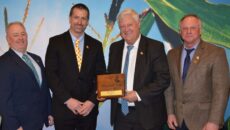When you think of Missouri, several things come to mind. For me, it is our state’s majestic river system. Growing up, I spent many summers swimming at the Ozark National Scenic Riverways and many mornings looking out at the Missouri River. Sadly, today I see and experience our waterways a little differently. Knowing how ubiquitous plastic trash is in our society, I think about the hidden cups and containers that run through those swift waters and where they are ending up. The heartbreaking truth is that, right now, a large amount of plastic waste is clogging our rivers in Missouri.
As a society, we are addicted to plastic. The Environmental Protection Agency (EPA) estimates that Americans throw away 100 billion plastic bags annually. If you tied those 100 billion plastic bags together, they would reach around the Earth’s equator 773 times. That is a lot of waste for a product that was only introduced to our country in the 1970s. And where does it go?
Plastic bags are fundamentally not recyclable. When they are tossed into recycling bins, they get entangled in municipal recycling machinery, causing delays and costly maintenance. These single-use plastics also damage the quality of materials that are being recycled into new products through this process. The reality is that most plastic bags either go into a landfill, where they have a history of leaking, or are incinerated, leading to more greenhouse gas emissions. Beyond that, as we’ve seen with the uptick of plastic waste due to the COVID-19 pandemic, this trash can also escape into the environment, littering our communities, polluting our waterways, and threatening the lives of our wildlife.
Since plastic doesn’t biodegrade, every piece of it ever made is still here, polluting our planet. It does break down, but it takes roughly 500 years — and during that journey, plastic will turn into microplastics that can easily get into our streams where birds, fish, and wildlife often mistake it for food. Horrifying pictures and videos of sea life being choked to death by plastic waste continue to show up in our media. Nothing we use for just a few short minutes should be allowed to pollute our communities for hundreds of years.
This isn’t just a local problem. Not only must we deal with our waste, but people and animals downstream also suffer the consequences. A 2017 Louisiana State University report found that more than 5 million tons of plastic waste enters the ocean every year. A majority of the waste found in the Gulf of Mexico, which has the highest concentration of microplastics in the world, comes from the Mississippi River. As Missourians, we must take responsibility for our role in this serious issue.
Right now, we have a chance to help address this pressing problem. Back in 2015, the Missouri Legislature passed a “plastic bag pre-emption law.” HB 722 became law despite a veto effort from Gov. Jay Nixon. This law has prevented any local governments from regulating the use of single-use plastic bags, making it much easier for this sort of pollution. Thankfully, an effort is underway to reverse that mistake. At Environment Missouri, we are thrilled to see Rep. Ingrid Burnett introduce HB 227 for the 2021 legislative session. This bill would repeal our plastic bag preemption law in the state and return control over plastic bag use to local officials.
Gov. Mike Parson has broadly come out in favor of local control for public health regulations because “a one-size-fits-all approach doesn’t work for every corner of the state,” he said. So why not have this same local control support behind plastic bag regulations? Many in our state have shown a willingness in the past to address this issue. For example, Columbia began discussions on a plastic bag ban just before the pre-emption law was enacted. At the same time, there have been several attempts in Jefferson City to increase preemption powers to allow the state to control such plastic products as to-go containers, straws, and utensils.
Remembering Gov. Parson’s words, we must prevent that one-size-fits-all approach when it comes to plastics. This substance has become a ubiquitous part of our lives, but it doesn’t have to be that way. We were able to shop in stores without plastic bags up until the 1970s, and other cities and states across the country are already doing precisely that again now. If we’re not ready to make that sort of commitment at the state level, we must give every Missouri municipality the right to reduce plastic waste because it’s vitally important for the safety of our clean water, environment, health, wildlife, and livestock.

Bridget Sanderson is the director of Environment Missouri.












